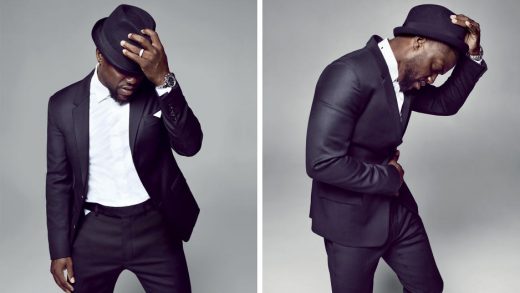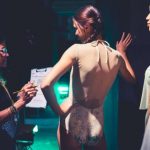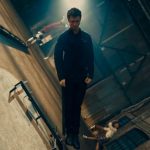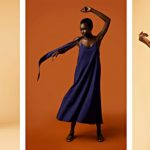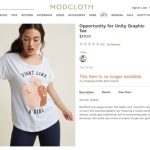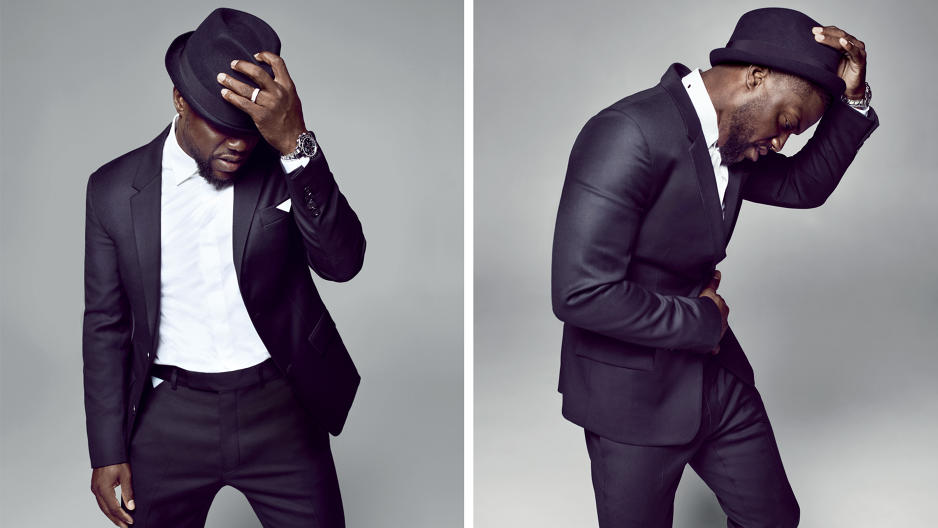Kevin Hart’s Funny Business
“I’m giving you 100%,” Kevin Hart says with commitment, settling into a chair in a conference room inside his new 18,000-square-foot Los Angeles production studio. “When I sit down for an interview, that’s what I do. I give 100% of my energy.”
Within three minutes, he’s talking on the phone.
Over the course of the next hour and a half, the 37-year-old comedian will stop to review ongoing plans for the studio space (“These rooms in the back need to be soundproofed”), check on his two young children zooming around the hallways (“That better not be soda you’re hiding behind your back!”), quiz his stylist about his wardrobe (“You sure those shoes are blue? They don’t look black to you?”), summon his barber to apply a touch-up coat of Just for Men hair dye (“Might as well do it while I’m just sitting here”), and check out the latest box-office numbers on his iPhone.
The 100% is there—just in short bursts. “I like to multitask,” he says, smiling at the understatement. “But I got it all under control.”
Hart is in Los Angeles on a one-week break from the set of Jumanji, a remake of the 1995 fantasy adventure that he and costar Dwayne Johnson are filming in Hawaii. There’s a lot to cram in—most notably the L.A. premiere of What Now?, a film documenting the Philadelphia stop on his hugely successful comedy tour. Hart’s stand-up show sold out New York’s Madison Square Garden in July 2015, something few comic acts have ever done, and earned $1 million in a single night in L.A. (A behind-the-scenes special of the tour on TBS promoted the film’s release.) But right now, on this October afternoon, he is most focused on his immediate surroundings. Hart purchased these soundstages—located on a nondescript strip of the San Fernando Valley—in August, and they’re about to be transformed into the creative center of Hartbeat Productions and Hartbeat Digital, the two pillars of his fast-growing eight-year-old entertainment empire.
Video: Kevin Hart On How To Be Productive: “Surround Yourself With Go-Getters”
“I want to shoot everything here,” he says. “TV shows, miniseries, digital. I want to build a real studio so that I can make and distribute my own movies.”
The last time anyone in Hollywood tried that—at least on the scale Hart seems to be contemplating—they had names like Goldwyn and Warner. Or at least names like Oprah, who recently shut down her Chicago soundstages and moved her OWN TV network to L.A., and Tyler Perry, who makes and distributes his Madea movies and other content through his studio in Atlanta. Hart considers Winfrey and Perry role models, although he doesn’t believe in limiting himself to what others have done before. He’s already the most successful comedian in the world, with an annual income Forbes estimates at $87.5 million, and one of the most bankable stars in Hollywood (his last three films, Ride Along 2, Central Intelligence, and The Secret Life of Pets, grossed a combined total of $584 million). He’s forged multimillion-dollar endorsement deals with retailers including Nike and H&M, developed TV shows for Comedy Central and other networks, and accrued a devoted fan base of nearly 100 million followers on Twitter, Facebook, and Instagram combined.
Still, he says, “Kevin Hart is just getting started.”
Hart describes himself as the “most positive guy in the world” and insists that his comedy takes “love to a new level.” That’s undoubtedly part of his mass appeal. While a lot of comics spin their acts out of resentment and angst, Hart seems to channel nothing but exuberance. Even when he curses—which he does energetically, both onstage and off—it’s endearing. “It’s innocent cussing,” he says. “I don’t have an angry bone in my body.”
Given his childhood, that’s an accomplishment. Hart grew up in gritty North Philadelphia, sharing a bunk bed with his older brother in a hallway of a one-bedroom apartment. His mother worked long hours as a computer analyst at the University of Pennsylvania; his father was seldom around, and not a particularly good influence when he was. “I do come from a bunch of fucked-up shit,” Hart says of his youth. “My dad was on drugs and in and out of jail. Dealing with that, being forced to make life decisions at a young age, that was hard.” (Hart has since reconnected with his father, who he says is now sober.) After high school, Hart got a job selling sneakers at City Sports, which began his lifelong obsession with shoes. “Back then, I couldn’t afford them, so when you finally do get some money, you splurge,” he says. Today, he owns 500 pairs of sneakers, some worth as much as $10,000, and he helped design his own “Hart Hustle” shoe for Nike, becoming its first non-athlete brand ambassador.
It was at City Sports that Hart discovered he could earn money by cracking jokes. His coworkers coaxed him into trying an open mic night at a local comedy club. Hart took home first prize: $75. He went back the following week and won another $75. After winning six weeks in a row, he quit his job.
“But then I showed up the next week and the amateur competition was done,” he says with a frown. “True story.”
Hart’s mom, Nancy, who died of cancer in 2006, had wanted her son to go to college. But she agreed to bankroll him for one year while he attempted to launch a stand-up career. He spent much of that time commuting to New York, where he hung around comedy clubs, sometimes opening for other comics. In 2001, he caught the attention of comedian Dave Attell, who introduced him to manager Dave Becky; Becky had steered the early careers of Louis C.K. and Aziz Ansari. “When I signed him, all he had was a homemade tape of a set at Caroline’s Comedy Club,” Becky recalls. “But he was such a talented kid. Plus, nobody works harder.”
Over the next several years, as he became better known as a comic, Hart made a few attempts at a film career. He was sure that 2004’s Soul Plane was going to make him a star. It earned a dismal $14 million and terrible reviews. Hart followed that with “countless pilots and movies,” says Becky. “When he was in Meet Dave with Eddie Murphy, we thought, ‘Oh, this is the one!’ Or Fool’s Gold with Matthew McConaughey: ‘This is the one.’ But it was never the one.” Finally, Hart made a decision. “He wanted more control,” Becky says, “so he focused on his stand-up. He would still do TV and movie parts, but he went on the road every weekend and worked. And suddenly he was playing arenas.”
Hart’s first big tour, 2009’s I’m a Grown Little Man, yielded a hit comedy CD. His second, 2011’s Laugh at My Pain, sold $15 million in tickets. His third, 2012’s Let Me Explain, sold $32 million. Upbeat and inoffensive, Hart’s act played as well in Copenhagen as it did in New York. “I talk about my life and what really matters,” he says, including his first marriage, the terrors of children’s birthday parties, and his height (he’s 5-foot-5). “My relationships, my parents, my flaws—these are things that people can relate to no matter where you are in the world.”
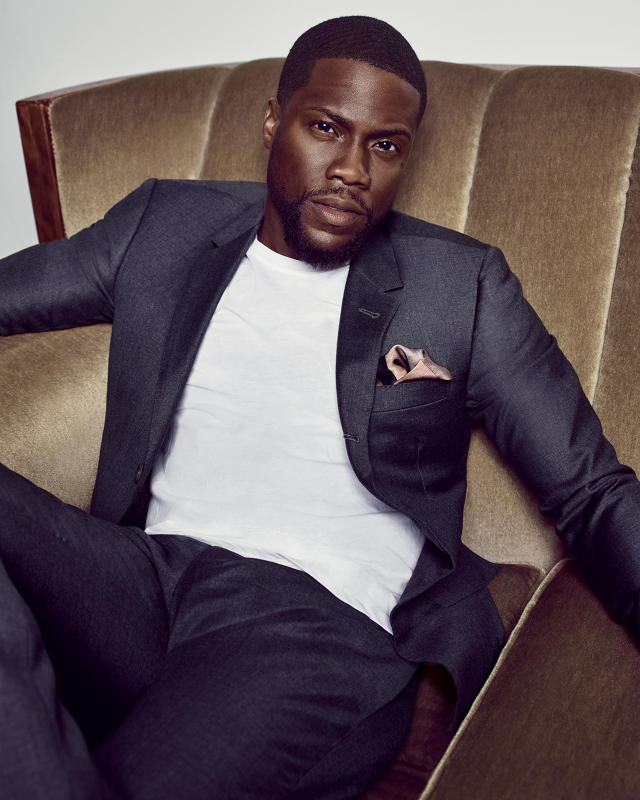
Another interruption. In the middle of a discourse on fame (“Being an actor today is different than being an actor (December 09, 2016)…”), Hart decides to do an impromptu Facebook Live broadcast.
He’s been expounding on social media, how it’s radically changed the relationship between celebrity and fan. And he’s going to demonstrate by pushing a few buttons on his iPhone and streaming real-time video to his 24 million Facebook followers. “I’m always letting you guys have a sneak peek into the world of Kevin Hart,” he tells them. “Right now I am in my studios and I’m doing an interview. I’m not going to tell you who the interview is for. It’ll come out, you’ll be able to read it, it’ll be dope.” As he talks into the camera, an army of followers assemble. Ten minutes later, as our discussion continues on full display, 250,000 people have tuned in. “But it’ll be rewatched,” he assures me after finally ending the stream and clicking the phone off. “This will probably get up to 800,000 views.” It gets 302,000, but still.
Being able to summon this kind of audience on demand makes Hart a valuable marketing tool for anybody trying to sell a film—for months, he’s been stoking interest in Jumanji with on-set tweets and Instagram photos—or, for that matter, sneakers, or even boxer shorts. “I was very leery of meeting with a celebrity,” says Thomas Patterson, founder and CEO of the high-end underwear purveyor Tommy John, which recently partnered with Hart on a line of skivvies. “But Kevin was so authentic. And he really does love the product.”
It was Hart who approached Tommy John about the collaboration. “I don’t do anything that would make you go, ‘It’s bullshit, he’s just doing it for the money,’ ” Hart says. When he finds a product he genuinely likes, he’ll not only endorse and promote it, but he might invest, as he did with Tommy John. In fact, Hart has a meeting in a few days to go over fabrics and waistbands. “I was buying whole racks of Tommy Johns, all the smalls,” he says, explaining why he got into the underpants business. “Then one day I thought I should go and talk to them about a partnership. Rather than just offering to put my face on the box, I said, ‘Let me show you how serious I am by putting up some money and creating something for me within your brand.’ ”
This collaborative instinct—”I don’t walk into a meeting with a ‘me, me, me’ attitude. I walk in and say, ‘How do I become your partner?’ ”—has served Hart well, and it will be increasingly valuable as his business grows into new territory. Hartbeat Digital, run by Jeff Clanagan, Hart’s friend of seven years (Clanagan produced Showtime’s Shaq All-Star Comedy Jam, which featured Hart regularly), is working to translate Hart’s fame and comedic sensibility to emerging platforms. In September, the company introduced Kevin Hart emojis—or “Kevmojis”—which became an instant best seller on iTunes. “Kim Kardashian’s emojis or Justin Beiber’s, they’re all animated faces,” says Clanagan. “But we did a photo shoot. We took a hundred pictures of Kevin making all kinds of faces, because he’s known for his facial expressions. We’re the first to use actual photographs as emojis.” Hartbeat Digital also has a video game in the works (Hartland is its tentative title), which will take players on a virtual action adventure with the comedian.
But the company’s biggest initiative, the one eating up most of its planning and resources (not to mention hundreds of hours of original Hartbeat-produced content) is Laugh Out Loud, Hart’s new streaming platform. “Comedy is so spread out,” he says, establishing the concept behind the $50 million venture, which Hartbeat Digital is financing in partnership with Lionsgate Studios. “You’ve got YouTube, where everything is all over the place. But there’s no one hub. You’re not really going to one site and saying this is where all the funniest comedians live.” He decided to build one, with his own sensibility.
Laugh Out Loud, an ad-supported service with a paid premium tier, will feature some existing films and other licensed material, but much of the content—”stand-up comedy, sitcoms, prank shows, movies,” Clanagan says—will be shot here at Hartbeat’s studios. Production is about to begin on She Funny, a sketch comedy show featuring YouTube stars Laura Clery and Jennah Brittany. And there’s already about 1,500 hours of other Hartbeat-produced material ready for the April launch, including 13 hours of stand-up shorts featuring rising comedians at last year’s New York Comedy Festival.
“This studio,” Hart says, sweeping an arm toward the soundstages, “this is ground zero. If Hartbeat Productions or Hartbeat Digital wants to produce something, they can use the stages that I own. A cooking show? All right, I’ve got a cooking stage. Is this a radio show? We’ve got a radio room. Everything is going to happen here.”
As evening approaches, Hart zips up his garment bag, slides his phone into his pocket, and heads out to his “mobile command center,” an enormous black Mercedes Sprinter van parked in the studio lot. Inside is everything Hart needs to keep his many projects going while in transit: Wi-Fi, video screens, Bluetooth keyboards, and a fully stocked fridge. “All the chairs are like airplane seats,” he points out, popping up the leg rest on one of the recliners. “And they all give massages.”
Hart originally procured the van—and its driver—after a DUI arrest in 2013, but it has proven so helpful that he’s continued using it even after getting his license back. “Traffic in L.A. gets pretty insane,” he says, “so while I’m on my way here or there, I can still work.” The van is his weapon in his war against wasted time, a never-ending pursuit that can leave his staff struggling to keep up. “He works relentlessly,” says Clanagan. “And you have to follow him around all day. Even when he’s in Hawaii shooting a movie. If he gets up at 5 or 6 in the morning, you’ve got to be ready, because you know he’s going to call first thing before he goes to the set. ‘What’s happening with the business?’ And you’ve got to be ready at the end of the day, because he’ll call then too, as soon as he wraps. And he’ll probably call three times throughout the day, as well.”
Hart admits that he can sometimes lose patience with his staff, especially when they exhibit a lack of ambition. (“I’m not an asshole, but I am a demanding boss,” he says.) But he is also very loyal. About a year ago, Hart promoted his longtime executive assistant, Wayne Brown—the guy in the van wearing the no days off T-shirt—to vice president of Hartbeat Digital. “We’ve had some fights,” Brown acknowledges. “We’ve cursed at each other. Kevin never runs out of batteries, so it can be exhausting sometimes. But at the end of the day, we’re like family.”
Like many driven bosses, Hart finds it difficult to delegate. He built this empire and has continued to fold the millions he earns from his tours (which he also finances himself) and other endeavors back into his businesses. Hart signs every check that gets cut at Hartbeat, he says, and focuses on details as small as the dimensions of the conference-room table he’s having custom-built. “I don’t like being part of projects that I don’t physically touch,” he says.
Hart realizes he may have some control issues, but he’s okay with that. Happy, even. The endless decisions are what it’s all about. “Once you’ve accomplished a goal, you’re all done,” he says. “And I don’t ever want to be all done.” Hart settles into a recliner for the half-hour drive to his home in Tarzana. Then he takes another phone call.
A version of this article appeared in the December 2016/January 2017 issue of Fast Company magazine.
Fast Company , Read Full Story
(12)

